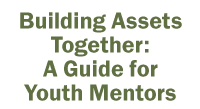

Mentoring Central’s Building Assets Together (BAT) Guide is designed to directly address the recurring request of mentors for effective, useful suggestions of things to do with their mentees by providing them with a resource that contains a curated springboard of ideas of possible match activities.
This resource uses a person-centered, asset-based approach to mentoring to support match goals and foster positive outcomes for mentees. The BAT Guide includes suggestions for ways mentors can consider and incorporate their mentees’ individual needs, background, goals, interests, and strengths when planning activities to do with their mentee. This resource also provides guidance to help mentors identify their mentees’ personal assets or strengths and then, try to strengthen or grow these assets during their day-to-day interactions.
Many mentoring programs, especially school- or afterschool site-based programs, are designed to last approximately a school year of nine to 10 months. Thus, the BAT Guide was designed to follow the lifecycle of an approximately 10-month-long mentoring relationship, hence there are 10 main topics. Mentors and mentoring programs can spend as little as a week on a topic or as much time as they like until they think that they have adequately addressed the goals associated with the topic.
Each of the 10 core topics provides strategies and suggestions for activities to help mentors meet specific mentoring relationship goals or “assets” that may help mentors and mentoring program staff assess and drive growth in mentees. Topics in this Guide are organized to provide mentors with strategies to meet their goals during each several of the stages that occur across the life of a mentoring relationship:
Getting to know and learning about your mentee.
Establishing your mentoring relationship by being consistent and dependable.
Helping your mentee set tangible goals for themselves that you can work towards as a team.
Understanding the importance of gratitude.
Preparing for upcoming holidays to decrease stress and build healthy expectations.
Practicing making positive healthy decisions in small ways.
Supporting your mentee in school and their interests.
Exposing your mentee to the important ways they can contribute to their community.
Modeling a positive friendship between you and your mentee.
Closing the relationship in a healthy and growth-fostering way.